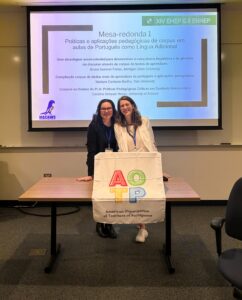Frederick Poole (MAFLT Core Faculty) at AAAL 2023
AAAL.org | American Association for Applied Linguistics | March 20, 2023
Presenter
Fred Poole, Michigan State University
This past weekend I presented at Roundtable Discussion at the American Associaiton for Applied Linguistics (2023) in Portland, Oregon. This was my first time doing a roundtable discussions. Roundtable discussions are different from regular presentations in that you do not get your own room rather you are provided a table with about 10 chairs and participants stop by to have a discussion with you on a topic of your choice. Presenters in roundtables often do make a powerpoint, but they simply present them on their laptops and use them for basic visuals. You can find my presentation at the bottom of this post. Roundtable discussions are often a bit shorter (e.g. 10-15 minutes) to allow for more disucssion time. These types of discussions are great for projects that are just getting started!
I presented a topic on data literacy and data-driven decision making for language teachers (see abstract below), which is something I am hoping to explore a bit more this year. I really enjoyed this style of presentation because unlike traditional presentations in which the audience generally asks questions related to methods and implications, in the roundtable discussion I got to have in-depth discussions with other scholars who were interested in my topic. I learned a lot about how data literacy is being used in other fields and how received several book recommendations and even an invitation to propose a colloqium on the topic next year.
Presentation Abstract
In the modern language classroom students participate in language learning activities via digital and physical spaces. Student data can be and is collected in various forms in these modalities that include summative and formative assessments, affect surveys, and behavioral data via digital environments. Given the time constraints placed on teachers, such data rarely undergo analysis, rather they are often used to make intuitive conjectures about the performance of a learner or the effectiveness of a lesson. Analyzing this data and illustrating trends and relationships between variables overtime could lead to insights about a learner, lesson, or class. Conducting these analyses and interpreting the results require both time and teacher data literacy. In this roundtable discussion, I will discuss the need for data literacy among language teachers. Data literate teachers are able to analyze and make sense of student data, and they are adept at identifying, collecting and storing data to be processed and reflected upon. Also, I will propose a research-practice partnership model in which teachers identify meaningful student data and researchers process and analyze data for teacher interpretation. This model addresses time constraints, however, for this model to be successful it is important to first identify types of data, analyses, and visualizations that will provide the most useful outcomes. Thus, in the final section of this roundtable and to spark a group discussion, I will share a series of analyses and data visualizations from a variety of fictitious language classrooms. These analyses and visualizations will serve as a mediator for discussion on the role of data in the language classroom. Specifically, we will discuss the following topics: A) what data should or should not be collected? B) What analyses provide actionable but interpretable results? C) What skills/knowledge do teachers need to make sense of the identified analyses and visualizations?
More on Data Literacy and Data-Driven Decision Making
For more information on this topic please see the following suggested readings:
Datnow, A., & Hubbard, L. (2015). Teachers’ use of assessment data to inform instruction: Lessons from the past and prospects for the future. Teachers College Record, 117(4), 1–26.
D’Ignazio, C., & Bhargava, R. (2016). DataBasic: Design principles, tools and activities for data literacy learners. The Journal of Community Informatics, 12(3).
Data Feminism by Catherine D’Ignazio and Lauren F. Klein
My slides for this presentation can be found below:


